Related Research Articles

The Bible is a collection of religious texts or scriptures, some, all, or a variant of which are held to be sacred in Christianity, Judaism, Samaritanism, Islam, the Baha'i Faith, and other Abrahamic religions. The Bible is an anthology originally written in Hebrew, Aramaic, and Koine Greek. These texts include instructions, stories, poetry, and prophecies, among other genres. The collection of materials that are accepted as part of the Bible by a particular religious tradition or community is called a biblical canon. Believers in the Bible generally consider it to be a product of divine inspiration, but the way they understand what that means and interpret the text varies.

The Book of Joshua is the sixth book in the Hebrew Bible and the Old Testament, and is the first book of the Deuteronomistic history, the story of Israel from the conquest of Canaan to the Babylonian exile. It tells of the campaigns of the Israelites in central, southern and northern Canaan, the destruction of their enemies, and the division of the land among the Twelve Tribes, framed by two set-piece speeches, the first by God commanding the conquest of the land, and, at the end, the second by Joshua warning of the need for faithful observance of the Law (torah) revealed to Moses.

Joshua, also known as Yehoshua, Jeshoshua, or Josue, functioned as Moses' assistant in the books of Exodus and Numbers, and later succeeded Moses as leader of the Israelite tribes in the Book of Joshua of the Hebrew Bible. His name was Hoshea the son of Nun, of the tribe of Ephraim, but Moses called him "Yehoshua", the name by which he is commonly known in English. According to the Bible, he was born in Egypt prior to the Exodus.
The Old Testament (OT) is the first division of the Christian biblical canon, which is based primarily upon the 24 books of the Hebrew Bible, or Tanakh, a collection of ancient religious Hebrew and occasionally Aramaic writings by the Israelites. The second division of Christian Bibles is the New Testament, written in Koine Greek.

The Torah is the compilation of the first five books of the Hebrew Bible, namely the books of Genesis, Exodus, Leviticus, Numbers and Deuteronomy. The Torah is known as the Pentateuch or the Five Books of Moses by Christians. It is also known as the Written Torah in Rabbinical Jewish tradition. If meant for liturgic purposes, it takes the form of a Torah scroll. If in bound book form, it is called Chumash, and is usually printed with the rabbinic commentaries.

The documentary hypothesis (DH) is one of the models used by biblical scholars to explain the origins and composition of the Torah. A version of the documentary hypothesis, frequently identified with the German scholar Julius Wellhausen, was almost universally accepted for most of the 20th century. It posited that the Pentateuch is a compilation of four originally independent documents: the Jahwist (J), Elohist (E), Deuteronomist (D), and Priestly (P) sources. The first of these, J, was dated to the Solomonic period. E was dated somewhat later, in the 9th century BCE, and D was dated just before the reign of King Josiah, in the 7th or 8th century BCE. Finally, P was generally dated to the time of Ezra in the 5th century BCE. The sources would have been joined at various points in time by a series of editors or "redactors".
The historicity of the Bible is the question of the Bible's relationship to history—covering not just the Bible's acceptability as history but also the ability to understand the literary forms of biblical narrative. One can extend biblical historicity to the evaluation of whether or not the Christian New Testament is an accurate record of the historical Jesus and of the Apostolic Age. This tends to vary depending upon the opinion of the scholar.
Ethics in the Bible refers to the system(s) or theory(ies) produced by the study, interpretation, and evaluation of biblical morals, that are found in the Hebrew and Christian Bibles. It comprises a narrow part of the larger fields of Jewish and Christian ethics, which are themselves parts of the larger field of philosophical ethics. Ethics in the Bible is unlike other western ethical theories in that it is seldom overtly philosophical. It presents neither a systematic nor a formal deductive ethical argument. Instead, the Bible provides patterns of moral reasoning that focus on conduct and character in what is sometimes referred to as virtue ethics. This moral reasoning is part of a broad, normative covenantal tradition where duty and virtue are inextricably tied together in a mutually reinforcing manner.

Biblical criticism is the use of critical analysis to understand and explain the Bible without appealing to the supernatural. During the eighteenth century, when it began as historical-biblical criticism, it was based on two distinguishing characteristics: (1) the scientific concern to avoid dogma and bias by applying a neutral, non-sectarian, reason-based judgment to the study of the Bible, and (2) the belief that the reconstruction of the historical events behind the texts, as well as the history of how the texts themselves developed, would lead to a correct understanding of the Bible. This sets it apart from earlier, pre-critical methods; from the anti-critical methods of those who oppose criticism-based study; from the post-critical orientation of later scholarship; and from the multiple distinct schools of criticism into which it evolved in the late twentieth and early twenty-first centuries.
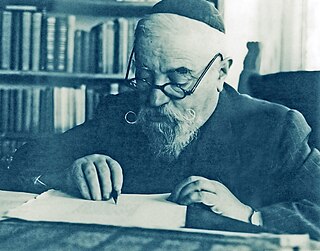
Umberto Cassuto, also known as Moshe David Cassuto, was an Italian historian, a rabbi, and a scholar of the Hebrew Bible and Ugaritic literature, in the University of Florence, then at the University of Rome La Sapienza. When the 1938 anti-Semitic Italian racial laws forced him from this position, he moved to the Hebrew University of Jerusalem.

In Judaism, God has been conceived in a variety of ways. Traditionally, Judaism holds that YHWH —that is, the god of Abraham, Isaac and Jacob/Israel, and the national god of the Israelites—delivered them from slavery in Egypt, and gave them the Law of Moses at Mount Sinai as described in the Torah. Jews traditionally believe in a monotheistic conception of God, characterized by both transcendence and immanence.
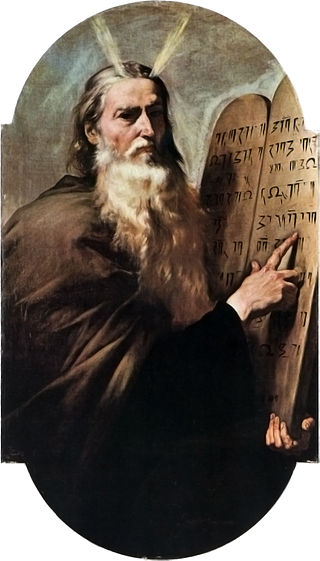
Mosaic authorship is the Judeo-Christian tradition that the Torah, the first five books of the Hebrew Bible/Old Testament, were dictated by God to Moses. The tradition probably began with the legalistic code of the Book of Deuteronomy and was then gradually extended until Moses, as the central character, came to be regarded not just as the mediator of law but as author of both laws and narrative.
"The Bible's Buried Secrets" is a Nova program that first aired on PBS, on November 18, 2008. According to the program's official website: "The film presents the latest archaeological scholarship from the Holy Land to explore the beginnings of modern religion and the origins of the Hebrew Bible, also known as the Old Testament. This archaeological detective story tackles some of the biggest questions in biblical studies: Where did the ancient Israelites come from? Who wrote the Bible, when, and why? How did the worship of one God—the foundation of modern Judaism, Christianity, and Islam—emerge?"
Bernard Malcolm Levinson serves as Professor of Classical and Near Eastern Studies and of Law at the University of Minnesota, where he holds the Berman Family Chair in Jewish Studies and Hebrew Bible. He is the author of Deuteronomy and the Hermeneutics of Legal Innovation, "The Right Chorale": Studies in Biblical Law and Interpretation, and Legal Revision and Religious Renewal in Ancient Israel; and is the co-editor of The Pentateuch as Torah: New Models for Understanding Its Promulgation and Acceptance. He has published extensively on biblical and ancient Near Eastern law and on the reception of biblical literature in the Second Temple period. His research interests extend to early modern intellectual history, constitutional theory, the history of interpretation, and literary approaches to biblical studies.
Normative Judaism's views on warfare are defined by restraint that is neither guided by avidness for belligerence nor is it categorically pacifist. Traditionally, self-defense has been the underpinning principle for the sanctioned use of violence, with the maintenance of peace taking precedence over waging war. While the biblical narrative about the conquest of Canaan and the commands related to it have had a deep influence on Western culture, mainstream Jewish traditions throughout history have treated these texts as purely historical or highly conditioned, and in either case not relevant to contemporary life. However, some minor strains of radical Zionism promote aggressive war and justify them with biblical texts.
David McLain Carr is Professor of Old Testament at the Union Theological Seminary in New York City. He is a leading scholar of the textual formation of the Hebrew Bible.
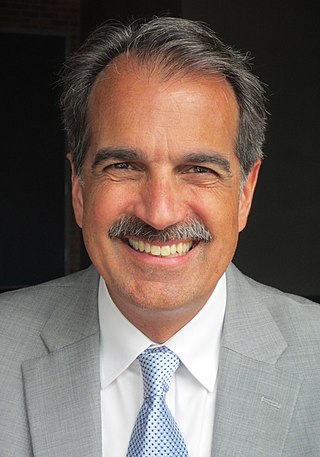
Gary A. Rendsburg is a professor of biblical studies, Hebrew language, and ancient Judaism at Rutgers University in New Brunswick, New Jersey. He holds the rank of Distinguished Professor and serves as the Blanche and Irving Laurie Chair of Jewish History at Rutgers University (2004–present), with positions in the Department of Jewish Studies and the Department of History.
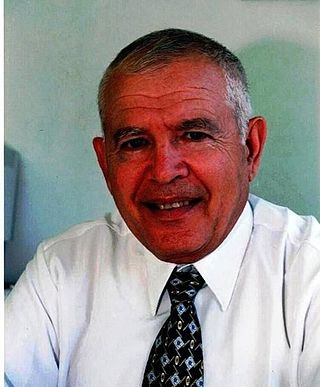
Moshe Garsiel is professor emeritus of Bible at Bar-Ilan University.
The composition of the Torah was a process that involved multiple authors over an extended period of time. While Jewish tradition holds that all five books were originally written by Moses sometime in the 2nd millennium BCE, leading scholars have rejected Mosaic authorship since the 17th century.
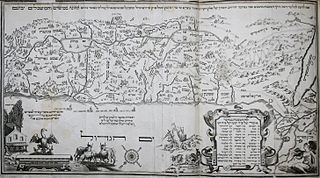
According to the Hebrew Bible, the Tribe of Simeon was one of the twelve tribes of Israel. The Book of Joshua locates its territory inside the boundaries of the Tribe of Judah. It is usually counted as one of the ten lost tribes, but as its territory was south of Judah and gradually being absorbed by Judah, it cannot be considered one of the tribes of the Kingdom of Israel and would certainly not have been affected by the Assyrian sack of the kingdom.
References
- ↑ Orthodoxy can withstand an unflinching, academic look at the Bible, says scholar, Times of Israel, May 2020.
- ↑ "Joshua Berman". Bar-Ilan University. Retrieved 10 July 2017.
- ↑ Joshua Berman Mosaic Profile
- ↑ Berman, Joshua (2020). Ani maamin : biblical criticism, historical truth, and the thirteen principles of faith. Jerusalem. ISBN 978-1592645381.
{{cite book}}: CS1 maint: location missing publisher (link) - ↑ Morrow, William S. (January 2010). "Joshua A Berman, . Created Equal: How the Bible Broke with Ancient Political Thought . New York: Oxford University Press, 2008. xiv+249 pp. $39.95 (cloth)". The Journal of Religion. 90 (1): 63–65. doi:10.1086/649970.
- ↑ Weisband, Howard M. (2009). "Creatively Presented". Jewish Political Studies Review. 21 (3/4): 236–240. JSTOR 25834868.
- ↑ Levinson, Bernard M. (2010). "The Bible's Break with Ancient Political Thought to Promote Equality—'It Ain't Necessarily so'". The Journal of Theological Studies. 61 (2): 685–694. doi:10.1093/jts/flq048. JSTOR 43665339. SSRN 1836685.
- ↑ Benjamin, Don C. (2010). "Review of Created Equal: How the Bible Broke with Ancient Political Thought". The Catholic Biblical Quarterly. 72 (2): 333–334. JSTOR 43727646.